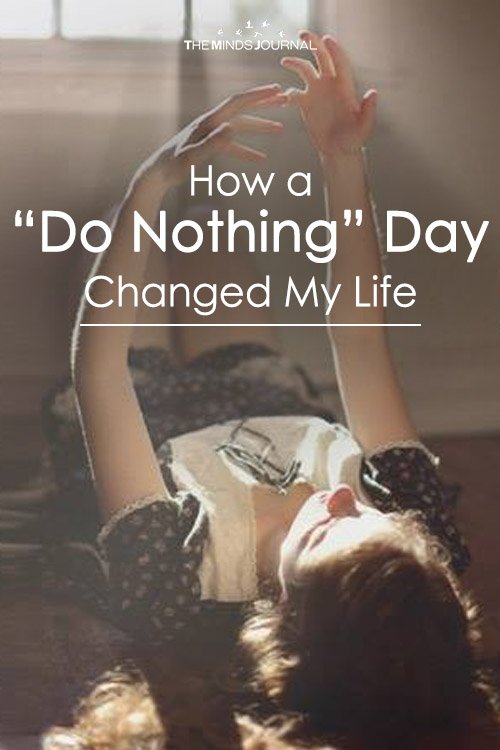Doing nothing. The mere thought gives you a sudden twitch, right?
Me too, my friend, but despite the twitch, I would like to make a proposal: for one day out of each week, you do absolutely nothing. This doesn’t mean you don’t go anywhere, or just sit on your couch and stare at the wall. It means, simply, that you clear your calendar and make space for what could happen.
You remove any social obligations, you let projects sit idle, you turn off your notifications, and you simply take a day to just be.
Ever since my first daughter was born, I felt the pull toward a do nothing day. I went back to work part-time when she was only eleven weeks old, and when I spent time away from her, her demeanor and behavior was just different.
She wasn’t as settled, and neither was I. I could tell she was a happier kid when I was able to spend one day just being with her. So when we were able to be together on my days off, I tried to make it a point to have one day where we didn’t have a million places to be, if I could help it.
No agenda, no rushing around, no one else to please. Just me and her, together. Doing whatever we felt like doing, or getting into whatever adventure may come our way.
Recently I heard someone say if you want to see where your priorities really lie, look at two things: your calendar and your bank statement.
If you believe your priorities are what truly matters to you, look no further than those two places to confirm or deny your hunch.
Let’s do an experiment. Take a look at your calendar, and take an inventory with me. How much of it is work related? How much of it is spent in social engagements? With family? Doing hobbies? Self improvement?
And how much white space do you see?
We have become a culture that is severely uncomfortable with white space. We don’t like being left alone with ourselves, and that’s because it’s not always fun.
We then have to face our true feelings, our negative emotions, our relational drama, and figure out what to do with it. It is much easier to simply turn on the TV, check our phones, and continue numbing.
We are terrified of silence, of nothing on the agenda — who are we without these things to hold us up, to give us significance?
We pack our schedules full, hoping that will keep us from stopping long enough to notice our inner lives are in great need of attention. The essence of simplifying your life is recognizing you have intrinsic value by simply being.
You matter, your life matters, and you have worth. Period.
You matter without the stuff, without the outside approval and conferred significance, without the career, the projects, the friends, without anything.
Just. You.
It takes the absence of an agenda to really learn yourself. It takes quiet. It takes room. It takes time. But everything in the world is going to fight you for it.
Learning to be comfortable with a “do nothing” day isn’t going to come easily. It is hard work, but it is work worth doing.
So today, look at your calendar. What can you say no to, just this time around? If there is a colored notification on each day, which of those can you clear out? Which day can hold some white space, some possibility, some openness?
Here are a few tips as you consider your own “do nothing” day:
1. Set it aside, and make it known.
We make things sacred through our intentions and our actions. So set your intention- what day will it be? And then let some people close to you know, so they can support you in your effort.
2. Don’t stress about it.
Wake up, and simply resist the urge to immediately DO. It might take time to break this habit, but as soon as you remove all of your go-to distractions, you will instantly notice how often you rely on them.
3. Pay attention.
Depriving ourselves of our normal comforts for even a short amount of time can go a long way in teaching us what we really need. We are able to notice when we have an urge to check our phone, or make a call. We can get a better feel for our own patterns of behavior and the motivations behind them.
4. Listen to your heart.
If someone invited you to attend something, don’t simply give a knee jerk response. Stop, and wait. Is this something you would typically just say yes to because you feel obligated? Or is this something that would really breathe life into you? Notice, and respond with authenticity and vulnerability.
5. Spend some time in silence.
Our brains are constantly bombarded with information, images, and noise. We tend to assume our minds are like fortresses, and all this stimulation can simply bounce off, but that is not the case. Our minds are vulnerable, and everything we see and experience influences our thoughts and emotions. So for your do nothing day, set a guard at the gate.
Have you ever given yourself a do nothing day? What would be your ideal way to spend one if you had it?
Become a Contributor at The Minds Journal
We Want To Hear Your Story. Share your work,thoughts and writings and we will make sure, it reaches the world! Submit Now










Leave a Reply